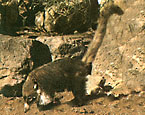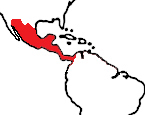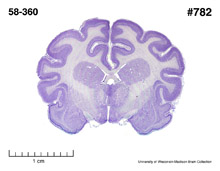|
White-nosed
Coati
(Nasua narica) #58-360 |
||||
|
|
Physical
characteristics and distribution
|
|
Head and body length of N. narica is
410-670 mm, tail length is 320-690 mm. Height at the shoulder
is about 305 mm, and weights range from 3-6 kg. Males are
usually larger than the females. The pelage is fairly long
and fairly coarse. Coloration is reddish brown to black with
yellowish to dark brown below. The muzzle, chin, and throat
are usually whitish. The feet are nearly black, there black
and gray markings on the face, and the semi-prehensile tail
is banded. N. narica has a long, pointed muzzle. The
forelegs are short, the hind legs long, and the tail is longer
than the body. |
|
Description
of the brain
|
|
Animal
source and preparation
|
|
All
specimens collected followed the same preparation
and histological procedure.
|
Other Related Resources (websites and publications)
List of Specimens | Explore Collections | Brain Sections | Brain Evolution | Brain Development | Brain Circuitry | Brain Functions | Location and Use | Related Web Sites | Contact Us | Search MSU Database | Personnel | Home


